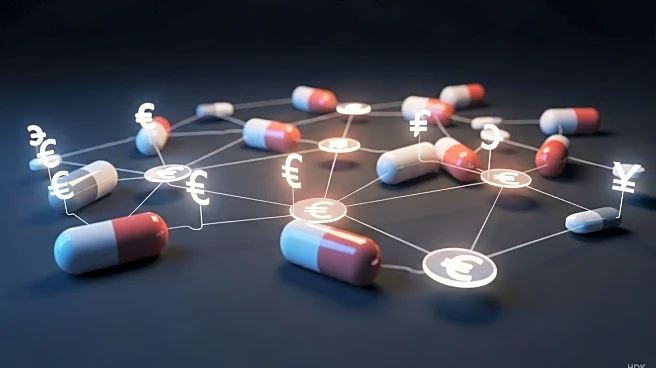What's Happening?
President Trump has announced plans to impose significant tariffs on imported pharmaceuticals, a move that could disrupt the current duty-free status of these products. Historically, imported medicines have entered the U.S. without tariffs, but this policy shift aims to impose a 15% tariff on some European goods, including pharmaceuticals, with potential duties of up to 200% on drugs from other regions. This decision is part of Trump's broader strategy to lower drug costs in the U.S., although experts warn it may lead to higher prices and shortages. The tariffs could affect supply chains, particularly for generic drugs, and impact consumers through increased prescription costs and insurance premiums.
Why It's Important?
The proposed tariffs could have significant implications for the U.S. healthcare system, particularly affecting lower-income households and the elderly who rely on affordable medications. The pharmaceutical industry, which has increasingly outsourced production to countries like China and India, may face challenges in adjusting to these tariffs. The move could incentivize drugmakers to relocate manufacturing to the U.S., potentially boosting domestic production but also increasing costs. Analysts suggest that even a modest tariff could raise drug prices by 10% to 14% as stockpiles diminish, highlighting the potential economic impact on consumers and the healthcare industry.
What's Next?
President Trump has indicated a delay in implementing the tariffs, allowing companies time to adjust by stockpiling medicines and shifting production to the U.S. Analysts predict that the full impact of the tariffs may not be felt until 2027 or 2028 due to these preparations. The administration is also investigating the national security implications of drug imports, which could influence future policy decisions. Drugmakers are already investing in U.S. operations, with companies like Roche and Johnson & Johnson planning significant expansions. However, the feasibility of building a complete supply chain domestically remains uncertain, especially for generic drug manufacturers.
Beyond the Headlines
The tariffs could lead to broader discussions on the resilience of the U.S. pharmaceutical supply chain, particularly in light of past disruptions during the COVID-19 pandemic. The reliance on foreign-produced active ingredients poses challenges for ensuring consistent drug availability. The potential need for government financing to support domestic production highlights the complexity of reshaping the industry. The move also raises ethical questions about balancing cost and accessibility of medications with national security concerns.








